Two Miserable Presidents (24 page)
Read Two Miserable Presidents Online
Authors: Steve Sheinkin

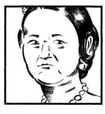
Life never got any easier for
Mary Lincoln
. Never really recovered from the death of her son Willie, she was shattered by the shock of seeing her husband murdered. After selling her jewelry and clothes to pay off family debts, Mary sailed to Europe with her son Tad. Just as they were becoming best friends, she watched him get sick and die at the age of eighteen. “Now in this world,” she said, “there is nothing left for me but the deepest anguish and desolation.” Mary began showing signs of mental illness, often sitting alone in the dark and mumbling about people who were trying to kill her. Her only remaining son, Robert, actually had her declared insane. After being confined in a nursing home for a few months, Mary moved into her sister's house in Springfield, Illinois. She died there in 1882 and was buried beside her husband.
Mary Lincoln
. Never really recovered from the death of her son Willie, she was shattered by the shock of seeing her husband murdered. After selling her jewelry and clothes to pay off family debts, Mary sailed to Europe with her son Tad. Just as they were becoming best friends, she watched him get sick and die at the age of eighteen. “Now in this world,” she said, “there is nothing left for me but the deepest anguish and desolation.” Mary began showing signs of mental illness, often sitting alone in the dark and mumbling about people who were trying to kill her. Her only remaining son, Robert, actually had her declared insane. After being confined in a nursing home for a few months, Mary moved into her sister's house in Springfield, Illinois. She died there in 1882 and was buried beside her husband.
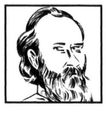
James Longstreet,
the man General Lee called “My Old War Horse,” fought by Lee's side until the surrender at Appomattox. But people always need someone to blame when they lose a war, and Southerners loved Lee too much to pick him. So they blamed Longstreet, claiming he had failed to follow Lee's orders at key battles such as Gettysburg. Longstreet defended himself, suggesting that Lee's poor strategy at Gettysburg had been the real cause of defeat. For this he was considered a traitor by many Southerners. Luckily, tempers have calmed a bit over 150 years, and Longstreet's reputation as a soldier has been making a strong comeback.
the man General Lee called “My Old War Horse,” fought by Lee's side until the surrender at Appomattox. But people always need someone to blame when they lose a war, and Southerners loved Lee too much to pick him. So they blamed Longstreet, claiming he had failed to follow Lee's orders at key battles such as Gettysburg. Longstreet defended himself, suggesting that Lee's poor strategy at Gettysburg had been the real cause of defeat. For this he was considered a traitor by many Southerners. Luckily, tempers have calmed a bit over 150 years, and Longstreet's reputation as a soldier has been making a strong comeback.
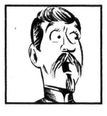
George McClellan
thought voters had made a poor choice in selecting Lincoln over him in the presidential election of 1864. Still, he was a bit relieved he would not have to run the country. “I feel that a great weight is removed from my mind,” he said. McClellan began writing a book about his experiences in the war, hoping, as he said, “to place my side of the story on the record.” His book was destroyed in a fire, though, and before he could finish rewriting it, he died unexpectedly at the age of fifty-eight. One of Mac's friends finished the book for him, calling it
McClellan's Own Story
and spicing it up by adding the general's private lettersâletters with nasty remarks about Abraham Lincoln that poor Mac had never intended to be made public. Said one harsh reviewer of
McClellan's Own Story:
“It were better for his memory had he left his story untold.”
thought voters had made a poor choice in selecting Lincoln over him in the presidential election of 1864. Still, he was a bit relieved he would not have to run the country. “I feel that a great weight is removed from my mind,” he said. McClellan began writing a book about his experiences in the war, hoping, as he said, “to place my side of the story on the record.” His book was destroyed in a fire, though, and before he could finish rewriting it, he died unexpectedly at the age of fifty-eight. One of Mac's friends finished the book for him, calling it
McClellan's Own Story
and spicing it up by adding the general's private lettersâletters with nasty remarks about Abraham Lincoln that poor Mac had never intended to be made public. Said one harsh reviewer of
McClellan's Own Story:
“It were better for his memory had he left his story untold.”

The Union soldier
John Ransom
survived fourteen months as a prisoner of war, watching many friends die of starvation and disease. He escaped, was captured, escaped again, and finally made it to freedom thanks to several enslaved men and women who fed him and guided him to a Union army camp. He was thrilled to see soldiers from his hometown, and he recalled they “could hardly believe it was myself that appeared to them.” With good reasonâthe Union army had reported Ransom dead a year before. But he was very much alive, and stayed that way until 1919.
John Ransom
survived fourteen months as a prisoner of war, watching many friends die of starvation and disease. He escaped, was captured, escaped again, and finally made it to freedom thanks to several enslaved men and women who fed him and guided him to a Union army camp. He was thrilled to see soldiers from his hometown, and he recalled they “could hardly believe it was myself that appeared to them.” With good reasonâthe Union army had reported Ransom dead a year before. But he was very much alive, and stayed that way until 1919.
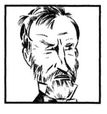
“I am sick and tired of fighting,”
William T. Sherman
griped at the end of the war. But he was a soldier at heart, and he stayed in the army, taking over from Grant as top commander in 1869. This was a time when the army was battling several Native American tribes in the West. Sherman drove the tribes onto reservations using the same merciless fighting style he had used in the South. He retired in 1884 and spent the last few years of his life doing what he really loved: going to the theater and attending fancy dinner parties at least four nights a week. Wherever he went he was surrounded by former soldiers who wanted to shake his hand. They called him “Uncle Billy.” He called them “my boys.”
William T. Sherman
griped at the end of the war. But he was a soldier at heart, and he stayed in the army, taking over from Grant as top commander in 1869. This was a time when the army was battling several Native American tribes in the West. Sherman drove the tribes onto reservations using the same merciless fighting style he had used in the South. He retired in 1884 and spent the last few years of his life doing what he really loved: going to the theater and attending fancy dinner parties at least four nights a week. Wherever he went he was surrounded by former soldiers who wanted to shake his hand. They called him “Uncle Billy.” He called them “my boys.”
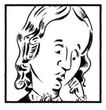
Just how important was
Harriet Beecher Stowe's
book
Uncle Tom's Cabin?
When Stowe visited the White House during the war, Abraham Lincoln supposedly said to her: “So you're the little woman who wrote the book that started this Great War!” Stowe's long writing career included thirty much less famous books, none of which caused
armed conflict. She and her family moved around a bit, finally settling in Hartford, Connecticut, where she lived next door to Mark Twain.
Harriet Beecher Stowe's
book
Uncle Tom's Cabin?
When Stowe visited the White House during the war, Abraham Lincoln supposedly said to her: “So you're the little woman who wrote the book that started this Great War!” Stowe's long writing career included thirty much less famous books, none of which caused
armed conflict. She and her family moved around a bit, finally settling in Hartford, Connecticut, where she lived next door to Mark Twain.
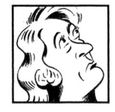
Suffering from headaches and nightmares,
Charles Sumner
did not return to the Senate until 1859, three years after being beaten by Preston Brooks. He resumed his role as a leading abolitionist, and after the war he tried to persuade Congress to pass a bill banning racial segregation in the United States. On his deathbed in 1874, surrounded by senators, his final words were: “Save my civil rights bill.” And Congress did pass a civil rights law banning segregationâninety years later.
Charles Sumner
did not return to the Senate until 1859, three years after being beaten by Preston Brooks. He resumed his role as a leading abolitionist, and after the war he tried to persuade Congress to pass a bill banning racial segregation in the United States. On his deathbed in 1874, surrounded by senators, his final words were: “Save my civil rights bill.” And Congress did pass a civil rights law banning segregationâninety years later.
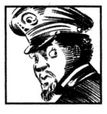
After cruising the Confederate ship
Planter
to freedom,
Robert Smalls
continued working as a naval pilotâonly now he was a free man, fighting for the Union. He returned to South Carolina after the war and bought the house in which he and his family had lived as slaves. Elected to the U.S. House of Representatives in 1874, Smalls spoke out often against new laws in the South that were denying African Americans the rights they had won after the Civil War. “All they need,” Smalls said of his fellow African Americans, “is an equal chance in the battle of life.”
Planter
to freedom,
Robert Smalls
continued working as a naval pilotâonly now he was a free man, fighting for the Union. He returned to South Carolina after the war and bought the house in which he and his family had lived as slaves. Elected to the U.S. House of Representatives in 1874, Smalls spoke out often against new laws in the South that were denying African Americans the rights they had won after the Civil War. “All they need,” Smalls said of his fellow African Americans, “is an equal chance in the battle of life.”

Other books
Charmed by Trent, Emily Jane
She's So Money by Cherry Cheva
Nowhere to Go by Casey Watson
Rebooting India: Realizing a Billion Aspirations by Nandan Nilekani, Viral Shah
Finding Mary Jane by Amy Sparling
Fall of a Philanderer by Carola Dunn
The English Teacher by Yiftach Reicher Atir
Going Up and Going Down by Eva Bielby
The Girls From Alcyone by Caffrey, Cary